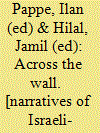|
|
|
Sort Order |
|
|
|
Items / Page
|
|
|
|
|
|
|
| Srl | Item |
| 1 |
ID:
101519


|
|
|
|
|
| Publication |
London, I B Tauris, 2010.
|
| Description |
vi, 462p.
|
| Standard Number |
9781848853454, hbk
|
|
|
|
|
|
|
|
|
|
|
|
Copies: C:1/I:0,R:0,Q:0
Circulation
| Accession# | Call# | Current Location | Status | Policy | Location |
| 055581 | 956.9405/PAP 055581 | Main | On Shelf | General | |
|
|
|
|
| 2 |
ID:
071704


|
|
|
|
|
| Publication |
2006.
|
| Summary/Abstract |
This report analyzes Palestinian opinion surveys over the past decade, tracking the shifting levels of support for Fatah and political Islam according to various indicators (e.g., refugee status, age, gender, occupation, and income level) and linking the shifts to political developments on the ground; the data are organized to highlight the impact of the second intifada. Among the interesting findings is the sharp gender division in support for the two movements, with women constituting the majority of political Islam's support and men dominating support for Fatah. Less surprising is Hamas's growing support in the poorest segment of the population, showing a degree of social "class" polarization. The author ends with a brief analysis of the results of the 2006 legislative elections in the light of the survey findings.
|
|
|
|
|
|
|
|
|
|
|
|
|
|
|
|
| 3 |
ID:
098108


|
|
|
|
|
| Publication |
2010.
|
| Summary/Abstract |
Arguing that the polarization of the Palestinian political field did not start with Hamas's takeover of the Gaza Strip in 2007, the author analyzes the factors that have eroded the cohesiveness and vitality of the Palestinian polity, namely, the paralysis of Palestinian political institutions, territorial and social fragmentation, and egregious outside interference. In this context, and in the absence of an internal Palestinian debate about the objectives of holding elections under occupation, the author shows that the timing and circumstances of the 2006 legislative elections were bound to precipitate the current state of disarray. Finally, he considers the way forward, highlighting the potential of public pressure in promoting national reconciliation.
|
|
|
|
|
|
|
|
|
|
|
|
|
|
|
|
|
|
|
|
|